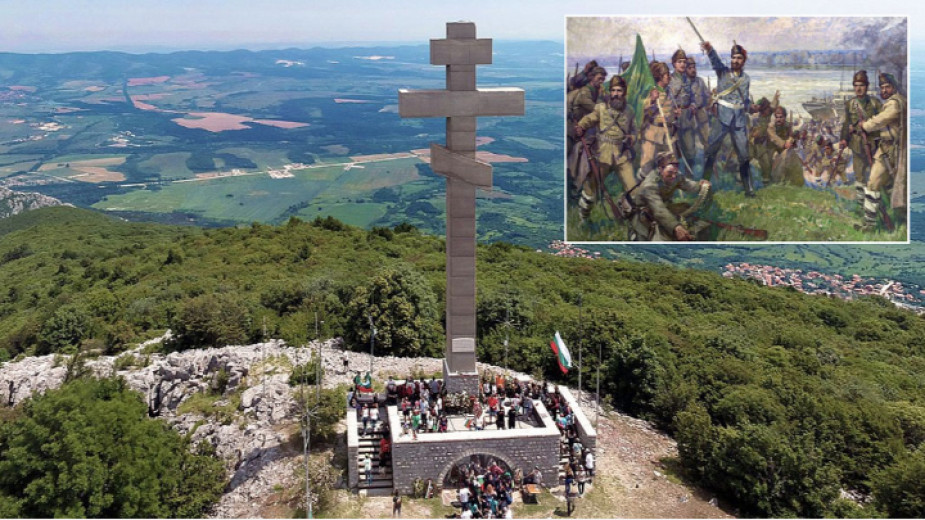
On June 2 Bulgaria marks the Day of Hristo Botev and the people who fell for Bulgaria’s freedom and independence. At 12 pm sharp their great deed will be honored with a minute of silence and the sound of the air raid sirens.
On the eve of this memorable date, Bulgaria’s revolutionary Hristo Botev was shot dead after an epic and uneven battle with the Ottoman army and bashi-bazouk in Vratsa Balkan Mountain. Following the example of Lord Byron and Shandor Petyofi Bulgaria’s great revolutionary dedicated his short life to Bulgaria’s freedom. The Bulgarian poet became a voivode in the midst of the April Uprising in 1876. He organized a detachment consisting of 200 people in Romania and later crossed the Danube onboard the Radetzky ship. On May 29, 1876 the rebels captured the Radetzky steamship and made the captain of Radetzky moor at the Bulgarian shore near the village of Kozloduy. Their brave march did not meet the expected support in the Third Revolutionary District. On June 1, 1876, Botev’s detachment reached the Vratsa Balkan Mountain and took position south of mount Vola at Kamarata, Kupena and Okolchitsa peaks. Surrounded by Ottoman army from all sides, they were in a heavy battle all day long. At sunset when the battle ended, the detachment’s headquarters gathered to discuss their next actions. This was the time when Botev was shot dead.
Although Bulgaria’s revolutionary died during the battle and his detachment was defeated, Europe soon learned about their great deed and public attention was focused on the enslaved Bulgarian nation. The capturing of Radetzky steamship had huge propaganda effect. Most publications about the Bulgarian uprising in Western printed media were connected with this episode. In the past 143 years Hristo Botev has been a symbol of the fight for freedom. Vasil Levski and Hrsito Botev are the two emblematic figures in the Bulgarian national pantheon and left a bright trace in the minds of the Bulgarian generations. The Day of Hristo Botev has been officially celebrated since 1901. Traditionally at the end of May hundreds of Bulgarians walk the 120-kilometer route from the Kozloduy shore to Okolchitsa peak in the Vratsa Balkan Mountain in honor of Hristo Botev and his holy deed. Almost all emblematic places connected with the route of Botev’s detachment to Okolchitsa were included in the list of 100 national tourist sites of Bulgaria. This year the celebrations began on May 24 with a light and sound show in the town of Vratsa held under the auspices of Bulgaria’s President Rumen Radev. The rich music and cultural program includes concerts, literature readings, educational games dedicated to the deed of the Bulgarian poet and revolutionary and his ingenious literary works. The celebrations will culminate on June 1 with a national worship at Botev’s death place Kamarata as well with a solemn rally and fireworks show in memory of the people who fell for Bulgaria’s freedom 1 at the monument to Hristo Botev in Vratsa.
Written by: Darina Grigorova
English version: Kostadin Atanasov
Photos: archiveOn the second day after Easter begins Bright Week. It is so called because of the light that Christ's Resurrection brings to the world. According to Orthodox tradition, it is a time when the Holy Apostles and the Virgin Mary are glorified. Bright Week..
Patriarch Daniil celebrated a divine service for the so-called Second Resurrection of Christ in the Sofia-based church of Saint Nedelya. Patriarch Daniil greets Bulgarians with “Christ is Risen” At the festive liturgy, texts from the Gospel..
Patriarch Danil of Bulgaria, Metropolitan of Sofia, greeted the faithful with the joyful words "Christ is risen!" In his Easter message, he called on Orthodox Christians to share the extraordinary joy of heaven with the world through a life of light and..
Patriarch Danil of Bulgaria, Metropolitan of Sofia, greeted the faithful with the joyful words "Christ is risen!" In his Easter message, he called on..
Patriarch Daniil celebrated a divine service for the so-called Second Resurrection of Christ in the Sofia-based church of Saint Nedelya...
On the second day after Easter begins Bright Week. It is so called because of the light that Christ's Resurrection brings to the world. According to..

+359 2 9336 661
